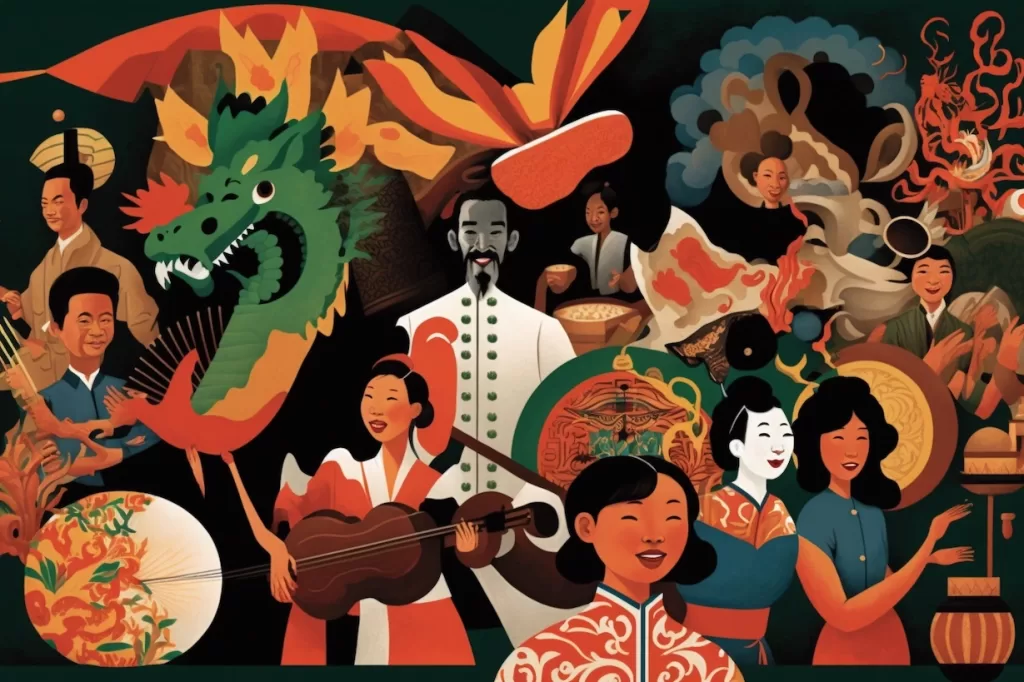Celebrating Asian Festivals in America: How to Keep Traditions Alive
From San Francisco's Chinese New Year Parade to hosting your own Diwali—discover 7 practical ways to honor your heritage while building new traditions in America.
The first Tet (Vietnamese Lunar New Year) I spent in America was honestly a bit sad. Back in Vietnam, Tet is everything — the whole country shuts down, families gather, there is food everywhere, and the energy is electric. In Singapore, where I lived for 15 years, there is still a strong Lunar New Year vibe thanks to the large Chinese community. But in the Bay Area, on Tet morning, the world just... kept going. People drove to work. Starbucks was open. Nobody was setting off firecrackers. It felt like any other day, and I have to admit, I felt a pang of homesickness that caught me off guard. T.T
But here is what I have learned since then: you can absolutely keep your traditions alive in America. It just takes a bit more effort than it did back home, and sometimes the celebrations look a little different. I think that is OK.
Find Your Local Celebrations
This was a game-changer for me. The Bay Area, it turns out, has a surprisingly active Asian festival scene. You just have to know where to look:
Chinese New Year Parade and Festival (San Francisco)
The Chinese New Year Parade in San Francisco's Chinatown is the real deal — colorful floats, lion dances, firecrackers, the whole experience. It is actually one of the largest Chinese New Year celebrations outside of Asia. The first time I went, I was genuinely moved. It is not Saigon, but it felt like home for a couple of hours.
Northern California Cherry Blossom Festival
This annual event in San Francisco's Japantown celebrates Japanese culture with traditional music, tea ceremonies, martial arts demonstrations, and gorgeous cherry blossoms. Sophie loved the taiko drumming. I loved the food stalls. Win-win.
Diwali Festival of Lights
Several Diwali celebrations happen across the Bay Area — in Cupertino, Fremont, and San Jose. Indian classical dance, live music, incredible food... even if you are not Indian, these celebrations are worth attending. From my experience, the South Asian communities here are incredibly welcoming to anyone who shows up with genuine interest.
Tet Festival (San Jose)
This was the one that really helped with my homesickness. San Jose has one of the largest Vietnamese communities outside of Vietnam, and their Tet Festival features traditional food, live music, cultural performances, and all the familiar sights and sounds. The first year I went, I ate banh chung and listened to nhac xuan (spring music) and felt something settle inside me. It is not the same as being home, but it is something.
Create Your Own Celebrations
Here is what I have realized: sometimes the best celebrations are the ones you make yourself. One year, I invited a few expat friends over for a Tet dinner — Vietnamese, Chinese, Korean, Indian families all together. Everyone brought a dish from their own tradition. Sophie helped me make banh tet (Vietnamese sticky rice cake). It was messy, it was not perfect, and the banh tet was slightly lopsided. But it was ours, and it might be my favorite Tet memory in America so far. :)
Cook the Food (This Is Non-Negotiable)
I think food is how traditions survive abroad. The ingredients might be slightly different (finding the right banana leaves in a Bay Area grocery store is an adventure), but the act of cooking traditional dishes connects you to home in a way that nothing else quite does. Asian supermarkets like 99 Ranch Market and H Mart have been lifesavers for finding ingredients.
Decorate, Even If It Feels Silly
Our first year here, I hesitated to put up red Tet decorations because nobody in our neighborhood was doing it. Then I thought: why not? Now we have red lanterns, mai blossoms (fake ones — real ones are hard to find here), and li xi (lucky money envelopes) ready every year. Our American neighbors actually love it. One of them asked me to explain the tradition, and we ended up having a lovely conversation about Vietnamese culture.
Find Your Community
Cultural associations, Facebook groups, Vietnamese/Chinese/Indian community organizations — these exist in most major US cities, and they are often the backbone of festival planning. Joining one was one of the best things I did after moving here. It connects you with people who understand the particular flavor of homesickness that comes from being far away during holidays.
Teach Your Kids
This one is close to my heart. Sophie was born in Singapore, and I want her to understand her Vietnamese heritage even though she is growing up American. We celebrate Tet together, she knows the stories behind the traditions, and she can make a passable spring roll. (Her wrapping technique needs work, but she is getting there.) I think passing these traditions to the next generation is how they survive — not perfectly, not exactly the same as back home, but alive.
Stay Connected with Family Back Home
Video calls during festivals are not the same as being there, obviously. But calling my mom during Tet, watching my cousins' celebrations on video, joining the family group chat as everyone shares photos of their holiday cooking — it helps. Technology does not replace presence, but it bridges the gap enough to matter.
My Honest Take
Keeping your traditions alive in a new country is work. There will be festivals that feel hollow compared to what you remember. There will be years when homesickness wins. But I think the effort is worth it — not just for yourself, but for your kids, for your community, and for the Americans around you who get to learn about a culture they might never have encountered otherwise.
The US is genuinely enriched by its immigrant communities keeping their traditions alive. I have to believe that, because the alternative — letting it all fade — feels like losing something irreplaceable.
What traditions do you keep alive in your adopted country? I would love to hear how other expats handle this.
Cheers,
Chandler






